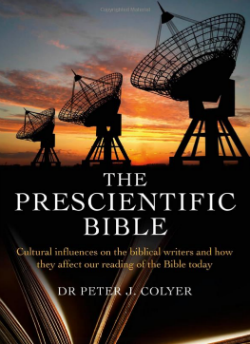The Prescientific Bible
Cultural influences on the biblical writers and how they affect our reading of the Bible today
The Prescientific Bible: Cultural influences on the biblical writers and how they affect our reading of the Bible today
By Peter Colyer
Circle books
ISBN 978-1-78099-913-5 (eBook)
ISBN 978-1-78099-914-2 (Paperback)
Reviewer: Pieter J. Lalleman

I hate it when Christians ascribe the results of sports matches to God; much of what is said in such cases is blasphemous. But I am among those who did see the hand of God at work in Michael Gorbachev.
Peter Colyer does not agree with me. Colyer, who is both a scientist and a theologian and was for six years a research fellow at Regent's Park College, Oxford, has produced a book which begins fascinatingly but ends in disappointment. He asks in how far the discoveries of science demand that we read the Bible differently from those before us. The issue of God’s hand in events comes up in chapter 4.
Colyer takes the reader on several journeys through the Bible. At the outset (p3) he goes so far as to state ‘that Christian faith is itself changing because of the impact of scientific thought on the way Christians understand the Bible’. An example of this change is that we can no longer hold to a physical heaven and hell within the known universe (4).
The first chapter introduces the book as a whole and in particular the idea of myth, a slippery concept. Colyer suggests that Genesis 1-11, Jonah and Daniel are mythological and therefore not meant as descriptions of how the authors thought the world works (21).
The second chapter discusses the question where God is; the Bible writers located God somewhere physically above the earth, but they were aware that he was not limited to these spheres. Chapter 3 deals with the natural world and in particular the weather. Colyer argues that the prophetic view of disasters as acts of God ‘may … be seen as opportunistic’ (58-59).
Specific weather conditions also cannot be attributed to God because we know about their natural causes (73-74). Yes, we do, but Colyer’s separation does not convince me. These two chapters are the most powerful of the book. Readers will need to come up with their own answers to the real issues raised.
Chapter 4 is about the human world; the author emphasizes that the Bible sees women as inferior to men. He has much to say about dreams but doubts if God speaks through them (90-91). And he flatly denies that God acts in individual events (119); here he flies in the face of a core conviction of many believers and his arguments for doing so did not convince me at all.
His theology is not always deep enough. In chapter 5 Colyer accepts miracles in principle but he rejects the concept of God’s omnipotence. He shows how modern science works with the concept of randomness but, contrary to what I expected, does not see it as a way of bringing God in (146). He displays naïve optimism when he writes that the world is on its way to perfection (151).
Chapter 6 is a less interesting listing of proto-scientific ideas in the Bible. Chapter 7 brings the conclusions but also revisits some earlier points.
Throughout the book many biblical texts are written out in full. The style is simple and the tone generally sympathetic, although occasionally a bit crude to my taste. Colyer uncritically accepts the historical-critical approach to the entire Bible but at the end he suddenly brings up the question of divine inspiration, denying it for most of the Bible (194).
On the final page, in true liberal style, he leaves it to the Bible reader to decide on the basis of their own ethical ideas whether they accept the Book’s authority or not. As a reader I now need to remember that the questions raised in this book are real even though I disagree with many of the answers. Theologians would do well to read the first four chapters.
The Revd Dr Pieter Lalleman is Acadamic Dean and Tutor of New Testament at Spurgeon's College
Baptist Times, 31/01/2014